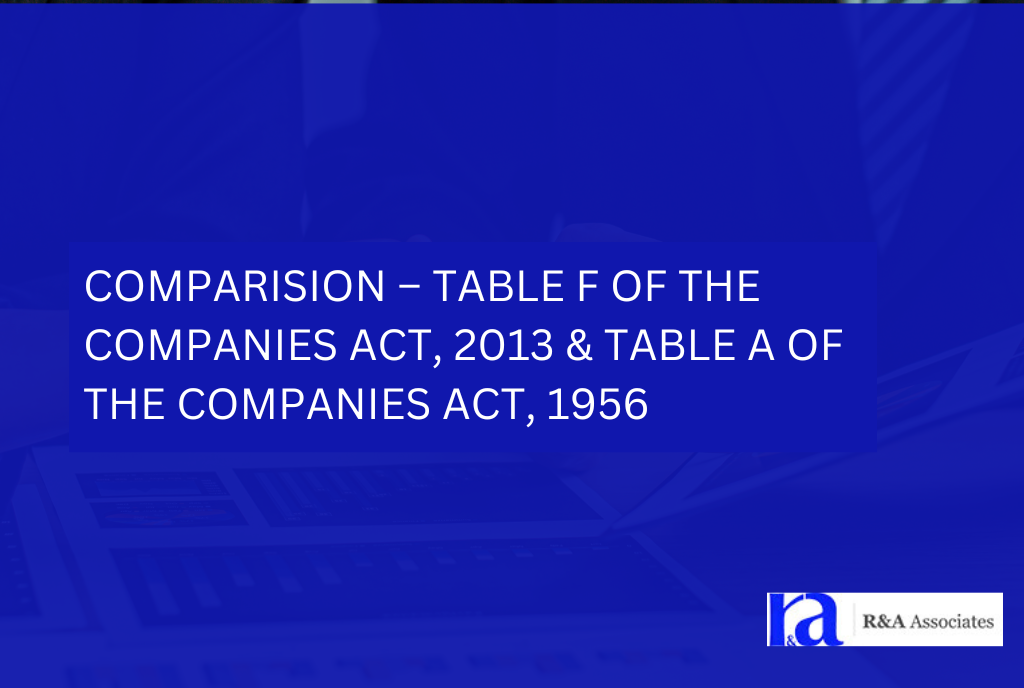| S. No |
Basis |
Table F of the Companies Act, 2013 |
Table A of the Companies Act, 1956 |
Difference |
| 1 |
Issue of share certificate in case of allotment to subscribers |
Within 2 months after incorporation |
No such provisions |
Now the Company has to issue share certificate within 2 months after incorporation to its subscribers |
| 2 |
Issue of share certificate in case of allotment of shares |
Within 2 months after allotment of shares |
Within 3 months after allotment of shares |
Now the Company has to issue share certificate within 2 months after allotment of shares |
| 3 |
Issue of share certificate in case of registration of transfer or transmission |
Within 1 month after the application for the registration of transfer or transmission |
Within 2 months after the application for the registration of transfer or transmission |
Now the Company has to issue share certificate within 1 month after the application for the registration of transfer or transmission |
| 4 |
Fees for issuance of several share certificates |
Rs. 20/- for each certificate beyond the first |
Rs. 1/- for each certificate after the first. |
Now Company can issue several share certificates upon payment of Rs. 20/- each.
|
| 5 |
Fees for issuance of duplicate share certificate in case defaced, lost, destroyed & torn etc. |
On payment of fees of Rs. 20/- per duplicate share certificate |
On payment of maximum fees of Rs. 2/- per certificate |
Now Company may charge maximum fees of Rs. 20/- for issue of fresh share certificate in case of defaced, lost, destroyed & torn etc. |
| 6 |
Issue and allotment of shares at par/premium |
At the discretion of Board of Directors |
No such provisions |
Now Board of Directors have power to issue and allot the shares at par/premium |
| 7 |
Default rate of interest to be levied on call- in- arrears |
10% p.a |
5% p.a |
Now Company can charge 10% interest on call-in-arrears |
| 8 |
Default rate of interest to be paid on call- in- advance |
12% p.a |
6% p.a |
Now Company has to pay 12% interest on call-in-advance |
| 9 |
Transmission of shares in case of One person Company |
- Nominee will be entitled to the title of the Shares
- Nominee will be entitled for dividends, rights and liabilities.
- becoming member, such nominee shall nominate any other person with the prior written consent of such person who, shall in the event of the death of the member, become the member of the company
|
No such provisions |
Now in case of One Person Company, nominee will be entitled for title, dividends, rights and liabilities. |
| 10 |
E-Voting |
A member may exercise his vote at a meeting by electronic means in accordance with section 108 and shall vote only once. |
No such provisions |
Now Company can provide e-voting facilities to its members. |
| 11 |
Power for company to have official seal for use outside India. |
Nothing is mentioned about maintenance of official seal for use outside India. |
The company may exercise the powers conferred by section 50 with regard to having an official seal for use abroad, and such powers shall be vested in the Board. |
Nothing is mentioned about maintenance of official seal for use outside India. |
| 12 |
Common Seal |
Its optional for Companies to have Common Seal |
It was mandatory for all Companies to have a Common Seal |
As per Companies (Amendment) Act, 2015, w.ef. 29.05.2015, it’s been made optional for a Company to have a Common Seal. |
